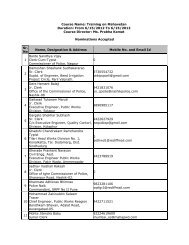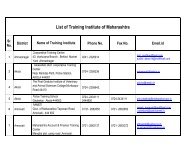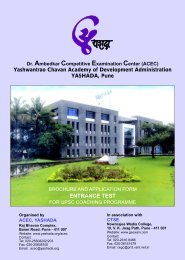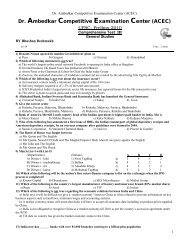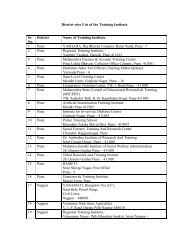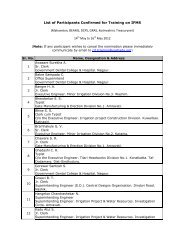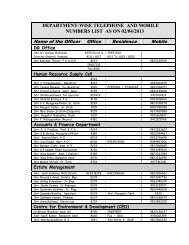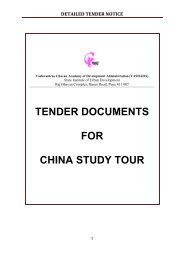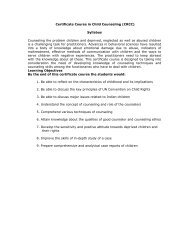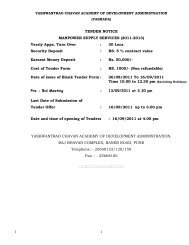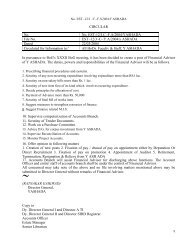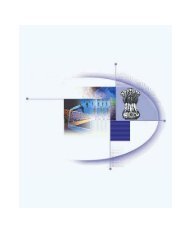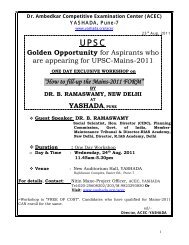View - yashada
View - yashada
View - yashada
Create successful ePaper yourself
Turn your PDF publications into a flip-book with our unique Google optimized e-Paper software.
REPORT<br />
ON<br />
TRAINING NEED ASSESSMENT WORKSHOPS<br />
FOR<br />
SOCIAL SECTOR<br />
UNDER<br />
THE PROJECT<br />
“CAPACITY BUILDING FOR POVERTY REDUCTION”<br />
Jammu & Kashmir<br />
Institute of Management, Public<br />
Administration & Rural Development<br />
Under the Project ‘Capacity Building for Poverty Reduction’, the Institute<br />
conducted 5 one - day workshops on Training Need Assessment for the Social
Welfare Sector. The workshops were conducted by the Core Group along with the<br />
members of the Steering Committee constituted for the Project. The details of the<br />
workshops are given below:<br />
1. State Level Workshop<br />
• 30 th November, 2007 at J&K IMPA Regional Centre, Jammu<br />
2. Divisional Level Workshop<br />
• 27 th November, 2007 at J&K IMPA Main Campus, Srinagar<br />
3. Three District Level Workshops<br />
• 2 nd January, 2008 at District Headquarters, Udhampur<br />
• 3 rd January, 2008 at District Headquarters, Udhampur<br />
• 7 th January, 2008 at J&K IMPA Main Campus, Srinagar<br />
The workshops were attended by 108 officers/officials representing almost all the<br />
levels of the Social Welfare Sector in J&K State. The list of the participants is<br />
given in Annexure I. The specific objectives postulated for the workshops were<br />
as follows:<br />
To identify existing gaps that impedes the organization from achieving<br />
their objectives efficiently and effectively<br />
To identify and select appropriate learning interventions that addresses<br />
these gaps<br />
To achieve enabling efficiencies through common learning solution.<br />
METHODOLOGY<br />
1
The workshops comprised the technical session, brain - storming sessions, group<br />
discussions and exercise - solving sessions. Shri Madhav Lal, IAS, the then<br />
Director General of the Institute, formally inaugurated the State level workshop.<br />
Sh. Lal gave introductory remarks about the project and highlighted the<br />
importance of the social sector in the context of overall development. Dr. Jahan<br />
Ara Jabeen, Nodal Officer of the Project made a presentation about the project and<br />
the activities to be undertaken under the project (Annexure – II). The participants<br />
were also briefed about the need, objectives and the methodology of the<br />
Workshop. Ms. Bismita Das, Member, Core-Group made a presentation on Social<br />
Welfare Sector in J&K wherein an attempt was made to review the existing<br />
schemes and policies of the sector. Senior level officers including Secretary to<br />
Govt., Special Secretary, Deputy Secretary and Under Secretary Social Welfare<br />
were also present in the Workshop.<br />
Training Needs Analysis is a pre- training tool which helps to strategically identify<br />
specific areas needing attention with regard to skills/ knowledge/ attitudes, a<br />
person is required to possess for holding a job. It also makes recommendations to<br />
bridge the gap. In this regard, two types of formats -Organizational and<br />
Individual were administered. Organizational format consisted of questions<br />
pertaining to the organization (Annexure – III). Individual format focused on<br />
KSA approach i.e., identification of skills, knowledge and attitudes required by a<br />
job (Annexure – IV).<br />
2
ORGANIZATIONAL ANALYSIS<br />
The Department of Social Welfare is under the Administrative control of the<br />
Secretary to Govt., Social Welfare at the State level and Directors at the Divisional<br />
level. The existing organizational structure as formulated in the workshops is<br />
placed at Annexure V. The mission statement of the Department as laid down in<br />
the Citizen’s Charter is empowerment of disadvantaged and marginalized<br />
sections of the society. For the achievement of this mission, the objectives of the<br />
Department are as follows:<br />
To provide institutional and non-institutional services for women<br />
(including destitutes, widows and their dependent children etc.),<br />
physically challenged, the aged and infirm, children (mal-adjusted,<br />
delinquents, orphans and handicapped) etc.<br />
To provide scholarships to SC and ST students<br />
To rehabilitate victims of the militancy related incidents<br />
To work for development of women, children and adolescent girls<br />
The officers/ officials of the Department were categorized into the following four<br />
levels in view of their functions/ roles / responsibilities for the purpose of<br />
identifying the training needs under the Project:<br />
Level I<br />
• Special Secretary<br />
3
• Additional Secretary<br />
• Under - Secretaries<br />
• Managing Directors<br />
Level II<br />
• Deputy Directors<br />
• Programme Officers<br />
• District Social Welfare Officers<br />
• Assistant Directors<br />
• Child Development Project Officers<br />
Level III<br />
• Assistant Child Development Project Officers<br />
• Tehsil Social Welfare Officers<br />
• Superintendents of Ashrams<br />
• Social Workers<br />
• Supervisors<br />
Level IV<br />
• Anganwadi Workers<br />
• Helpers<br />
INDIVIDUAL ANALYSIS<br />
4
The functional specifications arrived at during the course of deliberations with respect to<br />
above referred levels are shown as under:<br />
Level I<br />
• Policy Formulation<br />
• Administration and Management<br />
Level II<br />
• Formulation of Plans<br />
• Administration and Control<br />
• Office Management<br />
• Programmes and Schemes<br />
• Monitoring of the schemes<br />
• Financial Management<br />
Level III<br />
• Execution of programmes and schemes<br />
• Office Management<br />
• Supervision and Coordination<br />
• Conduct of surveys<br />
• Identification of beneficiaries<br />
• Organization of awareness camps<br />
Level IV<br />
5
• Heath Checkups<br />
• Pre School Education<br />
• Providing nutrition<br />
• Organizing Groups<br />
• Coordination and control of AWCs<br />
PROBLEM AREAS<br />
Some of the important issues/ problems identified during the course of deliberations are as<br />
follows:<br />
• non- availability of guidelines of different Programmes/ Schemes<br />
• lack of proper infrastructure at district, tehsil and block level<br />
• political interference<br />
• less honorarium for AWWs /Helpers<br />
• evaluation of Schemes not done scientifically<br />
• lack of trained support system<br />
• non -availability of departmental manuals<br />
• additional responsibilities to officers<br />
TRAINING NEEDS<br />
During the deliberations, it was observed that the officers/ officials generally lack<br />
knowledge and skills in some areas of administration. Besides, no formal training<br />
arrangement exists in the State. Instead officers of the level of Child Development Project<br />
Officers are being sent to NIPCCD for job-specific courses, and for other required and<br />
6
need based issues, the services of other training institutions in and outside the State are<br />
availed. For Anganwadi workers, the Department has its own training centres both at<br />
Srinagar and Jammu.<br />
In view of these inadequacies, training needs identified for the respective levels stand as<br />
under:<br />
Level I<br />
• administrative skills<br />
o decision making<br />
o leadership qualities<br />
o communication skills<br />
• plan formulation<br />
Level II<br />
• plan formulation<br />
• financial management particularly powers of DDO’s<br />
• administrative laws<br />
• office management<br />
• methods of monitoring<br />
• policies/ programmes on socio-economic development<br />
• human resource management<br />
• administrative skills<br />
Level III<br />
7
• financial management<br />
• knowledge about social welfare schemes<br />
• behavioural skills<br />
• methodology of organizing camps<br />
• social audit<br />
• role of Local Bodies vis a vis Social Welfare Schemes<br />
• record management<br />
Level IV<br />
• community participation<br />
• participatory learning techniques<br />
• motivation techniques<br />
After conducting the TNA Workshops for various levels in the Department, it was<br />
observed that in order to improve the service-delivery mechanism of the Department, the<br />
capability of the officers need to be enhanced through intensive training interventions. The<br />
training modules need to be developed to suit the specific requirements of the officers at<br />
different levels. There is also a need to develop trainers to enhance the capabilities of<br />
front-line service providers so that the goal of empowerment is achieved.<br />
8
Annexure –I<br />
List of Participants<br />
State - Level TNA Workshop<br />
(30 th November, 2007)<br />
9
Annexure –I<br />
List of Participants<br />
State - Level TNA Workshop<br />
(30 th November, 2007)<br />
S.No. Name of the participant Designation Contact<br />
Number<br />
1. Mr. N.K. Verma, IAS Secretary to Govt., Social Welfare<br />
Department, J&K<br />
2. Mr. Muzaffar Iqbal, KAS Special Secretary to Govt., Social Welfare<br />
Department, J&K<br />
3. Dr. K.K. Kichloo, KAS Additional Secretary to Govt., Social<br />
Welfare Department, J&K.<br />
4. Mr. Naseem Javed<br />
Under Secretary to Govt., Social Welfare<br />
Chowdhury,<br />
Department, J&K<br />
5. Mr. M.L.Koul Under Secretary to Govt., Social Welfare<br />
Department, J&K<br />
6. Mr. Satish Nehru Director, Directorate of Social Welfare,<br />
Jammu<br />
7. Dr. Satpal Deputy Director ( Administration),<br />
Directorate of Social Welfare, Jammu<br />
8. Mr. Mohammad Hussain Bhat Deputy Director ( ICDS) Directorate of<br />
Social Welfare, Jammu<br />
9. Ms. Ritu Gupta Assistant Directors ( Administration),<br />
Directorate of Social Welfare, Jammu<br />
10. Mr. Veerji Hangloo Assistant Director (Schemes ),<br />
Directorate of Social Welfare, Jammu<br />
11. Mr. Gopal Krishan Gupta, Assistant Director (Planning), Directorate<br />
of Social Welfare, Jammu<br />
12. Dr. Naheed Soz Managing Director, J&K Women<br />
Development Corporation<br />
13. Ms. Syed Shahzada Bano Secretary , J&K Women Development<br />
Corporation<br />
14. Mr. Mohammad Subhan Dar Accounts Officer, J&K Women<br />
Development Corporation<br />
15. Ms. Teja Koul Development Officer, J&K Women<br />
Development Corporation<br />
9419000329<br />
9419015519<br />
9469113374<br />
9419125576<br />
9419105722<br />
9419184754<br />
9419185081<br />
9419130769<br />
9419110491<br />
11
16. Mr. Naveen Kumar Sharma Managing Director, J&K SC. ST & BC<br />
Development Corporation, Jammu<br />
17. Ms. Sheela Bhagat, KAS Secretary, J&K SC. ST & OBC<br />
Development Corporation, Jammu<br />
18. Ms. Hafiza Muzaffar Secretary, State Women Commission,<br />
Jammu<br />
19. Smt. Sunita Bhagat Child Development Project Officer,<br />
Directorate of Social Welfare Department,<br />
Jammu<br />
20 Smt. Chenderkanta Child Development Project Officer,<br />
Directorate of Social Welfare Department,<br />
Jammu<br />
21. Smt. Sarunder Kour, Child Development Project Officer,<br />
Directorate of Social Welfare Department,<br />
Jammu<br />
19419136042<br />
9906373233<br />
9419170940<br />
9419884891<br />
12
Divisional Level TNA Workshop<br />
(27 th November, 2007)<br />
S.No. Name of the participant Designation Contact<br />
Number<br />
1. Ms. Tabasum Shafat Kamili District Social Welfare Officer, Pulwama<br />
2. Ms. Rubina Kousar District Social Welfare Officer, Srinagar<br />
3. Ms. Nighat Majid Child Dev. Project Officer, Khanyar<br />
4. Mr. Mohd Amin Shah Child Dev. Project Officer, Pampore<br />
5. Mr. Itrat Hussain Rafiqi Distt. Programme Officer, ICDS Kupwara<br />
6. Mr. Riaz Beigh Child Dev. Project Officer, Budgam<br />
7. Mr. Mohd Aslam Child Dev. Project Officer, Srinagar<br />
8. Ms. Aarifa Malik Asstt. Child Dev. Project Officer, Budgam<br />
9. Ms. Nighat Alam Asstt. Child Dev. Project Officer, Srinagar<br />
10. Syed Tahira Bashir Asstt. Child Dev. Project Officer, Srinagar<br />
11. Ms. Afreed Jan Asstt. Child Dev. Project Officer,<br />
Pampore<br />
12. Ms. Rifat Aarif Child Dev. Project Officer, Tangmarg<br />
13. Mr. Sajad Hussain Programme Officer, Budgam<br />
14. Mr. Gh. Mohiudin Bhat Programme Officer, ICDS, Anantnag<br />
15. Ms. Bureeda Majid Tehsil Social Welfare Officer, Srinagar<br />
16. Gh. Mohiuddin Bhat Tehsil Social Welfare Officer, Bijbehara<br />
17. Mr. Showkat Ahmad Dar Programme Officer, Baramulla<br />
18. Mr. Mohammad Subhan Programme officer, Pulwama<br />
13
District Level TNA Workshop<br />
(2 nd January 2008)<br />
S.No. Name of the participant Designation Contact<br />
Number<br />
1. Smt. Rava Kumari Programme Officer , ICDS Project<br />
Udhampur<br />
2. Sh. Yash Pal Sharma Distt. Social Welfare Officer, Udhampur<br />
3. Smt. Kanta Sharma CDPO, ICDS Project Udhampur<br />
4. Smt. Coni Sethi CDPO, ICDS Project Majalta<br />
5. Smt. Veena Aima CDPO, ICDS Project Chenani<br />
6. Smt. Sonali Arun CDPO, ICDS Project Reasi<br />
7. Sh. Naresh Kumar CDPO, ICDS Project Arnas<br />
8. Smt. Vidhushi Kapoor CDPO, ICDS Project Kapoor<br />
9. Smt. Shashi Bala CDPO, ICDS Project Pouni<br />
10. Smt. Munni Bhat CDPO, ICDS Project Panchari<br />
11. Smt. Santosh Tikoo CDPO, ICDS Project Ghordi<br />
12. Mohammad Anwar Banday CDPO, ICDS Project Dudu Basantgarh<br />
13. Sh. Mohan Lal Stora TSWO, Udhampur<br />
14. Sh. Sham Lal TSWO, Mahore<br />
15. Smt. Raj Kumari TSWO, Reasi<br />
16. Smt. Sharda Devi TSWO, Chenani<br />
17. Smt. Parveen Kumari TSWO, Ramnagar<br />
18. Sh. Sunil Kumar Dubey Suptt. Bal Ashram , Udhampur<br />
19. Smt. Shalini Gupta Social Worker, TSWO, Udhampur<br />
20. Sh. Sita Ram NGOs, Udhampur<br />
14
District Level TNA Workshop<br />
(3 rd January, 2008)<br />
S.No. Name of the participant Designation Contact<br />
Number<br />
1. Tirath Kour Supervisor, ICDS Project, Pouni<br />
2. Sureshta Rani Supervisor, ICDS Project, Udhampur<br />
3. Sushma Kohli Supervisor, ICDS Project, Gondi<br />
4. Mrs. Satvindar Kour Supervisor, ICDS Project, Udhampur<br />
5. Mrs. Satvindar kour Supervisor, ICDS Project, Ramnagar<br />
6. Mrs. Kamlash Kumari Supervisor, ICDS Project, Chenani<br />
7. Mrs. Anjana Sharma Supervisor, ICDS Project, Chenani<br />
8. Mrs. Sushma Kumari Supervisor, ICDS Project, Chanani<br />
9. Mrs. Maya Devi Jamwal Supervisor, ICDS Project, Pouni<br />
10. Mrs Rattna Devi Anganwadi Worker, ICDS Project, Pouni<br />
11. Ms. Surinder Kour Anganwadi Worker, ICDS Project Pouni<br />
12. Ms. Sushila Jamwal Supervisor, ICDS Project, Ramangar<br />
13. Mrs. Sneha Lata Supervisor, ICDS Project, Reasi<br />
14. Mrs. Chander Prabha Supervisor, ICDS Project, Reasi<br />
15. Mrs. Kailash Devi Anganwadi Worker, Gordhin<br />
16. Mrs. Neelam Kumari Aganwadi Worker, Ghordi (Bindla)<br />
17. Chanchal Devei Aganwadi Worker, Jakhani<br />
18. Mrs. Neelam kumari Aganwadi Worker, Dalak<br />
19. Ms. Anjali Devi Aganwadi Worker, Theni Dhar, Upper<br />
Samroli<br />
20. Mr. Lalit Kumar Khajuria Secretary, Sanaj Colony Morcha,<br />
Udhampur<br />
21. Mrs. Sita Ram Sharma Samaj Kalyan Morcha, Udhmapur<br />
15
22. Mr. Sanjeev Singh National Child labour Society, Field<br />
Officer<br />
23. Mr. Sham Lal Field officer, National Child Labour<br />
Society<br />
24. Mr. Bhojan Bharti Jr. Asstt., Indian Red Cross<br />
25. Ms. Kanta Badyal Supervisor , ICDS Project, Majalta<br />
26. Ms. Kiran Bala Supervisor, ICDS Project, Majalta<br />
27. Mrs. Reeta kumari Supervisor, ICDS Project, Majalta<br />
28. Ms. Sunila Devi Anganwadi Workers, Majalta<br />
29. Ms. Sunita Gupta Anganwadi Worker, Majalta<br />
30. Ms. Sushma Devi Anganwadi Worker, Udhampur<br />
31. Ms. Taro Devi Anganwadi Worker, Udhampur<br />
32. Ms. Ranu Devi Anganwadi Worker, Panchari<br />
33. Ms. Chander Rekha Anganwadi Worker, Panchari<br />
34. Ms. Taj Banu Supervisor , ICDS Project, Mahor<br />
35. Ms. Nidhi Anganwadi Worker, ICDS Project, Reasi<br />
36. Ms. Poonam Anganwadi Worker, Reasi<br />
37. Ms. Anita Devi Anganwadi Worker, ICDS (Hatti) Pouni<br />
38. Ms. Reena Deve Anganwadi Worker<br />
39. Mrs. Pooja Rani ICDS Project<br />
40. Mrs. Rajni Bala Supervisor, ICDS Project<br />
16
District Level TNA Workshop<br />
(7 th January, 2008)<br />
S.No. Name of the Participant Designation<br />
1. Ms. Mehmooda Mir Supervisor, ICDS , Rehama Baramulla,<br />
2. Mr. Altaf Hussain Superintendent/ Social Worker, MFI Kangan<br />
3. Mr. Farooq Ahmad Tehsil Social Welfare Officer, Pampore<br />
4. Ms. Gulshan Supervisor , ICDS Project, Bandipora<br />
5. Ms. Mymoona Bano Asstt. CDPO , ICDS Project, Tral<br />
6. Ms. Ulfat Jan Asstt. CDPO, ICDS Project, Batwara<br />
7. Ms. Jawahira Tak Tehsil Social Welfare Officer , Anantnag<br />
8. Mr. Abdul Rashid TSWO, Tangmarg<br />
9. Mr. Peerzada Altaf<br />
Hussain<br />
Tehsil Social Welfare Officer, Sumbal (Sonawari)<br />
17
Annexure -II<br />
Welcome<br />
to<br />
Training Needs Assessment Workshop<br />
Conducted by<br />
Core Group<br />
GoI- DfID Project<br />
on<br />
Capacity Building For Poverty Reduction<br />
Organized by<br />
J&K Institute of Management, Public Administration & Rural Dev.<br />
Srinagar/ Jammu.<br />
The United Nations Millennium Summit<br />
in<br />
September 2000<br />
adopted<br />
Millennium Development Goals<br />
• The Millennium Development Goals:( Target:2015)<br />
• Eradicate Extreme Poverty and Hunger.<br />
• Achieve Universal Primary Education.<br />
• Promote Gender Equality and Empower Women.<br />
• Reduce Child Mortality.<br />
• Improve Maternal Health.<br />
• Combat HIV and AIDS, Malaria and other Diseases.<br />
• Ensure Environmental sustainability.<br />
• Develop a Global Partnership for Development.<br />
18
Department for International Development<br />
(DfID)<br />
British Governm ent’s Fight<br />
against<br />
world poverty.<br />
1996 Conference of Chief Secretaries<br />
Action Plan for Effective and Responsive Govt<br />
(APERG)<br />
1997 Conference of Chief Ministers<br />
Accountable and Transparency and Improving the performance<br />
citizen friendly govt. Right to Information and integrity of the public<br />
services<br />
19
Department for International Development<br />
Deptt. of Personnel & Trainings<br />
Deptt. Of Administrative Reforms &<br />
Pub. Grievances<br />
Promotion & Implementation<br />
Of<br />
Reform agenda<br />
Implementation<br />
Of<br />
APERG<br />
Public Service delivery system Citizen friendly & poor friendly<br />
Capacity Building for Poverty Reduction<br />
Departm ent of International<br />
Develop m en t<br />
GOAL: To enhance the institutional Capacity of the<br />
Govt. of India to develop and effectively im plem ent pro<br />
poor policies and services.<br />
Support: To provide effective, strategic support to<br />
GoI in their governance reform s and capacity building<br />
program m es.<br />
Out puts (In d ica tive o n ly)<br />
1) DARP G re fo rm in itia tive s d e live r im p rove d service s to<br />
the benefit of poor people.<br />
2) Enhance hum an resource capacity within civil<br />
service to deliver pro- poor policies and<br />
program m es.<br />
20
Capacity Building:<br />
Th e a b ility<br />
of<br />
Institutions, organizations & individuals at all levels<br />
Of<br />
administrative machinery<br />
to<br />
provide services to the poor.<br />
The process<br />
Of<br />
strengthening and sustaining<br />
such capacity<br />
is<br />
capacity building.<br />
Programme Objective<br />
Improving service delivery<br />
by<br />
Capacity building<br />
through<br />
intensive training<br />
for<br />
front line service providers<br />
leading to<br />
poverty reduction.<br />
21
CAPACITY BUILDING FOR POVERTY REDUCTION (CBPR) ROGRAMME<br />
Poverty Reduction- The End Objective<br />
Intermediate Variables<br />
Public Service Delivery Mechanism<br />
Institutions Organizations Individuals<br />
Creating Pressure Improving the Service Delivery Entity Incentivising Desirable Behaviour<br />
(Citizen Empowerment) (Strengthening Organizations & Processes ( Reinforcing Appropriate Behaviour)<br />
Related to Service Delivery)<br />
_________________________________________________________________________________________________________________<br />
CBPR Programme<br />
addresses<br />
all aspects<br />
( Institutional, Organizational & Individual)<br />
of<br />
Public Service Delivery Mechanism.<br />
OPERATIONAL STRATEGY<br />
-Institutional & Organizational related initiatives are being taken up by<br />
The Department of Administrative Reforms and Public Grievances (DoARPG),<br />
MOPPG&P, Govt. of India.<br />
-Individual/ Organizational (Training ) related initiatives are being taken up by<br />
The Department of Personnel & Training (DoPT), MOPPG&P, Govt. of India<br />
-DoPT<br />
has constituted a Core Team to implement the Project initiatives.<br />
-Funding is being provided by DfID.<br />
-Project Management Consultancy is being Provided by Adam Smith International, I<br />
UK.<br />
-Haryana Institute of Public Administration (HIPA), Gurgaon has been identified as the<br />
Core Incubating Group (CIG) /CBPR National Implementing Agency (NIA).(<br />
-State Administrative Training Institutes (ATIs(<br />
ATIs) ) have been identified as<br />
State Implementing Agency (SIA).<br />
22
J & K<br />
Institute of Managem ent, Public Adm inistration and<br />
Rura l Developm ent<br />
(IMP A)<br />
State Im plem enting Agency.<br />
Project Activities<br />
1. MoU with the DOPT, GOI.<br />
2. Identification of Sectors.<br />
3. Identification of Districts.<br />
4. Finalization of Project Modalities.<br />
5. Administrative arrangements:<br />
Dedicated Core Team Identified.<br />
Steering Committee Nominated.<br />
6. Project Activity Phasing (Time Budgeting ).<br />
7. First State Level Meeting with Secretaries, HoDs/ DCs & Distt. . Officers.<br />
23
Project Activities<br />
8. Review of the Existing Institution’s s Training Resources.<br />
9. First Round of Departmental Consultative Meetings.<br />
10. Nomination of Departmental Nodal Officers.<br />
11. State Level Sectoral Reports.<br />
12. Formulation of Training Needs Assessment Templates.<br />
13. Training Needs Assessment Workshops.<br />
14. TNA Reports.<br />
15. Design Training Modules.<br />
16. Conduct TOT.<br />
17. Training for the Target Group.<br />
18. Monitoring and Evaluation of the Training at District Level.<br />
State Level Sectoral Review<br />
Social Sector:<br />
Education Sector:<br />
1. Social Welfare Department.<br />
2. J&K Women Development<br />
Corporation.<br />
3. J&K State Commission for Women.<br />
4. J&K Advisory Board for Gujjars &<br />
Bakerwals.<br />
5. J&K SC, /ST and Backward Classes<br />
Dev. Corporation.<br />
1. School Education.<br />
6. J&K State Scheduled Castes Advisory<br />
Board.<br />
24
Sector Review Methodology:<br />
• Introduction to the Sector.<br />
• Review of Policies/ Schemes/ Programmes.<br />
• Present scenario/ status:<br />
– Benchmarks for Dev.<br />
– Targets.<br />
– Achievements.<br />
• Impact of Policies/ Schemes/ Programmes.<br />
• Constraints / bottlenecks on Development.<br />
• Fund flow ( Plan & Non Plan).<br />
• Implementation Machinery.<br />
• Job Specification<br />
• Capacity Building Systems.<br />
• New Initiatives undertaken.<br />
– Policy Level<br />
– Administrative Level.<br />
– Capacity Building.<br />
• Summary & Conclusions.<br />
Systematic Approach to Training<br />
Identify Training Needs<br />
Assessment of Results<br />
Performance Problem<br />
Plan and Design Training<br />
Implement Training<br />
25
Training Needs Analysis: Pre- training tool which helps to strategically<br />
identify specific areas needing attention.<br />
Objectives :<br />
To identify existing gaps that impede organizations from<br />
achieving their objectives efficiently and effectively.<br />
To identify and select appropriate learning interventions that<br />
address these gaps.<br />
To achieve Enabling Efficiencies through common learning<br />
solution.<br />
Training Needs analysis<br />
Organizational<br />
Analysis<br />
Individual<br />
Analysis<br />
Template Attached<br />
Template Attached<br />
26
Annexure -III<br />
Capacity Building for Poverty Reduction: A Training Initiative<br />
(DoPT - DfID Project)<br />
Training Needs Assessment<br />
ORGANISATIONAL Format<br />
1. Name: ………………………………………………………………………………<br />
2. Designation: ………………………………………………………………………<br />
3. Organization: ………………………………………………………………………<br />
4. How would you spell out the Vision Statement for your Organization?<br />
_____________________________________________________________________<br />
_____________________________________________________________________<br />
_____________________________________________________________________<br />
_____________________________________________________________________<br />
5. What are the objectives of your Organization?<br />
i) ____________________________________________________________<br />
ii)<br />
iii)<br />
iv)<br />
iv)<br />
____________________________________________________________<br />
____________________________________________________________<br />
____________________________________________________________<br />
____________________________________________________________<br />
28
1. Organizational functions:<br />
i) _____________________ vi) ____________________<br />
ii) _____________________ vii) ____________________<br />
iii) _____________________ viii) ____________________<br />
iv) _____________________ ix) ____________________<br />
v) _____________________ x) ____________________<br />
2. For the achievement the above subjects and conduct of functions, how is your<br />
organization structured? (Please use a separate page).<br />
8. Indicate the number of employees as per the identified levels:<br />
Level (s)<br />
Number<br />
I ________________________________ ____________<br />
II ________________________________ ____________<br />
III ________________________________ ____________<br />
IV ________________________________ ____________<br />
V ________________________________ ____________<br />
9. Identify the jobs and tasks, the above referred levels are expected to perform:<br />
Level (s) Jobs Tasks<br />
I _____________________ ________________________<br />
II _____________________ ________________________<br />
III _____________________ ________________________<br />
IV _____________________ ________________________<br />
29
V _____________________ ________________________<br />
10. Has the Department prepared Training Policy/ Training Action Plan / Departmental<br />
Manuals etc?<br />
Yes/ No.<br />
If yes, please specify<br />
i) ____________________________________________________________<br />
ii)<br />
iii)<br />
iv)<br />
____________________________________________________________<br />
____________________________________________________________<br />
____________________________________________________________<br />
v) ____________________________________________________________<br />
11. What Programmes/ Schemes are being implemented by your Organization?<br />
i) _____________________ vi) ____________________<br />
ii) _____________________ vii) ____________________<br />
iii) _____________________ viii) ____________________<br />
iv) _____________________ ix) ____________________<br />
v) _____________________ x) _____________________<br />
12. For the successful implementation of these Programmes/ Schemes, what training<br />
subjects would you prefer by order of priority?<br />
i) _____________________ vi) ____________________<br />
ii) _____________________ vii) ____________________<br />
iii) _____________________ viii) ____________________<br />
iv) _____________________ ix) ____________________<br />
v) _____________________ x) _____________________<br />
30
13. Has your Organization any Institutional training arrangement? If yes, please specify:<br />
S.No. Training Institute No.of<br />
Trainers<br />
Trg. Prog.<br />
Conducted<br />
during<br />
current<br />
financial<br />
year<br />
Adequacy of facilities in<br />
Trg. Institute<br />
Class Hostel Trg.<br />
room. Y/N Equpt.<br />
Y/N<br />
Y/N<br />
Trg.<br />
Manual<br />
Pakage<br />
Dev.<br />
Y/N<br />
1.<br />
2.<br />
3.<br />
14. Please specify significant performance (work related) problems of the front line<br />
service providers of your Organization:<br />
S. No. Service Providers Problems Specified Problems having<br />
Training Implication<br />
15. What mode of training would you suggest for imparting training to the front line<br />
service providers?<br />
________________________________________________________________________<br />
________________________________________________________________________<br />
________________________________________________________________________<br />
31
Annexure- IV<br />
Capacity Building for Poverty Reduction: A Training Initiative<br />
(DoPT - DfID Project)<br />
Training Needs Assessment<br />
Individual Format<br />
1. Name: ……………………………………………………………………………….<br />
2. Designation: ……………………………………………………………………….<br />
3. Department: ………………………………………………………………………..<br />
4. Experience: …………………………………………………………………………<br />
5. Educational Qualification: …………………………………………………………<br />
6. Have you received Induction training? Yes / No<br />
If yes, please specify<br />
__________________________________________________________________<br />
__________________________________________________________________<br />
__________________________________________________________________<br />
7. Have you received job chart, work norms or any other work manual from your<br />
organization?<br />
Yes / No<br />
If yes, please specify<br />
__________________________________________________________________<br />
__________________________________________________________________<br />
__________________________________________________________________<br />
32
8. What performance standards have been set for you?<br />
S. No. Performance Standards By Whom Set<br />
9. What specific jobs and tasks do you presently perform?<br />
Jobs<br />
Tasks<br />
i) _____________________ ________________________<br />
ii) _____________________ ________________________<br />
iii) ______________________ ________________________<br />
iv) _____________________ ________________________<br />
v) _____________________ ________________________<br />
10. Have you undergone any training in the context of the present job? Yes/No<br />
If yes, please specify<br />
__________________________________________________________________<br />
__________________________________________________________________<br />
__________________________________________________________________<br />
33
11. Are you satisfied with your job performance? Yes/No<br />
Please elaborate:<br />
__________________________________________________________________<br />
__________________________________________________________________<br />
__________________________________________________________________<br />
12. What difficulties do you face while performing these tasks?<br />
i) _____________________ vi)______________________<br />
ii) _____________________ vii______________________<br />
iii) _____________________ viii)_____________________<br />
iv) _____________________ ix)______________________<br />
v) _____________________ x)______________________<br />
13. To overcome these difficulties and to enhance your work effectiveness &<br />
efficiency what efforts have you made so far?<br />
i) ____________________________________________________________<br />
ii<br />
iii)<br />
iv)<br />
____________________________________________________________<br />
___________________________________________________________<br />
____________________________________________________________<br />
14. Is your progress of work assessed? If yes, what feedback do you generally get?<br />
i) ____________________________________________________________<br />
ii)<br />
iii)<br />
____________________________________________________________<br />
____________________________________________________________<br />
34
iv)<br />
____________________________________________________________<br />
15. Do you need training to overcome these difficulties? Yes/No<br />
If yes, which training subjects would you like to identify?<br />
Knowledge: ________________________________________________________<br />
__________________________________________________________<br />
Skills:<br />
__________________________________________________________<br />
__________________________________________________________<br />
Attitudes: __________________________________________________________<br />
__________________________________________________________<br />
16. What significant challenges do you foresee in your work?<br />
i) ____________________________________________________________<br />
ii)<br />
____________________________________________________________<br />
v) ____________________________________________________________<br />
iv)<br />
vi)<br />
____________________________________________________________<br />
____________________________________________________________<br />
17. How do you ensure people’s participation in your Organization’s functioning?<br />
__________________________________________________________________<br />
__________________________________________________________________<br />
__________________________________________________________________<br />
35
18. Do you think that your work - related performance will improve after receiving<br />
such training?<br />
Yes/No<br />
If yes, how?<br />
________________________________________________________________<br />
__________________________________________________________________<br />
19. Have you received any training for the last two years?<br />
Yes/No<br />
If yes, please indicate:<br />
S.No. Name of the Trg.<br />
Courses<br />
Duration Contents Trg.<br />
Conducted by<br />
20. What suggestions would you like to give in order to improve service delivery<br />
mechanism of your Organization?<br />
i) _____________________ vi) _____________________<br />
ii) _____________________ vii_____________________<br />
iii) _____________________ viii) ____________________<br />
iv) _____________________ ix) _____________________<br />
v) _____________________ x) ______________________<br />
36
Annexure- V<br />
37
Secretary Social<br />
Wlf<br />
Executive Director (K) Director ( J) Corporation<br />
Prog. Officer<br />
Dy. Dir.ICDS<br />
Dy. Dir. (Admn.)<br />
D.D. (Tribal)<br />
CAO<br />
DSWO’s<br />
CDPO’s<br />
ACDPO’s<br />
Supervisors<br />
Aww’s<br />
Helpers<br />
Asstt. Director<br />
TSWO’s<br />
Superintendents<br />
Social Workers<br />
38




